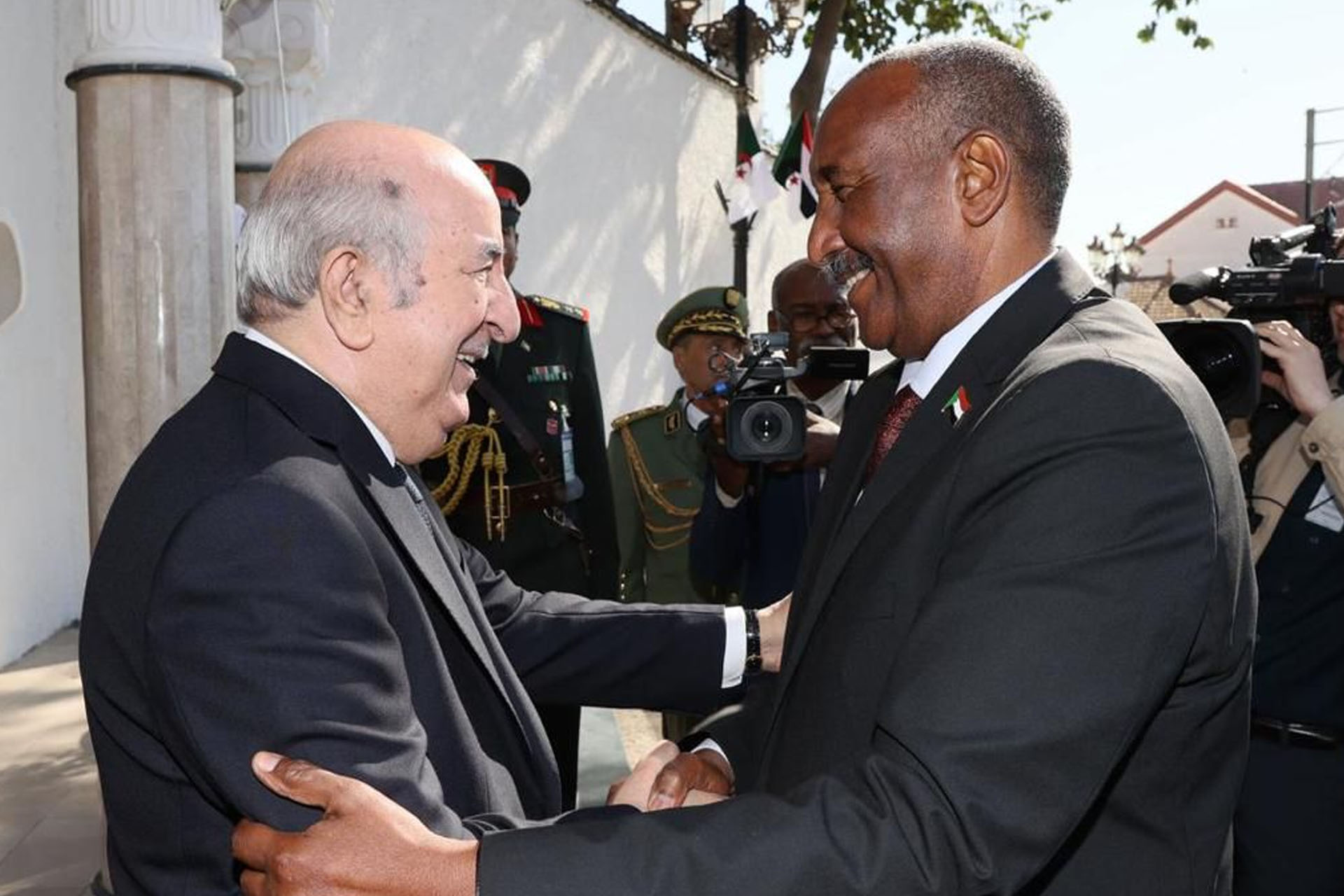Al-Burhan (right) and Tebboune discussed the current situation in Sudan (Sudanese press)
With the continuation of the war in Sudan, and Khartoum entering into a rift with the Intergovernmental Authority for Development in East Africa (IGAD), the head of the Sudanese Transitional Sovereignty Council, Abdel Fattah al-Burhan, visited Algeria on January 28 and 29, and held discussions with Algerian President Abdelmadjid Tebboune, which discussed... Ways to support cooperation between the two countries.
Al-Burhan also informed Tebboune, according to a statement issued by the Sovereignty Council, of developments in the situation in Sudan “against the backdrop of the Rapid Support Militia’s rebellion against the state and its institutions and its targeting of civilians and infrastructure.”
Since last April, a war has continued between the Sudanese army and the paramilitary Rapid Support Forces, led by Mohamed Hamdan Dagalo (Hemedti), leaving more than 13,000 dead and about 8 million displaced, according to the United Nations.
According to a political analyst, Al-Burhan, who is also the army commander, is trying to seek help from Algeria to create a balance with IGAD, which faces Sudanese accusations of siding with the other side in the conflict.
The visit was considered a remarkable development, and raised many questions about its timing, purpose, feasibility, and the role that Algeria can play in resolving the Sudanese crisis.
Status and capabilities
Algeria has an active presence at the regional and international levels through its non-permanent membership in the UN Security Council and its leadership of the African Group in the Council. Algeria will also compete for the presidency of the African Union for a year, during the 37th session of the African Summit in Addis Ababa on February 17 and 18, a position that will go to North Africa this session.
By visiting Algeria, Al-Burhan aims, according to observers, to benefit from its African capabilities and position in supporting the government and the army in confronting the Rapid Support Forces, which Khartoum says are supported by regional countries.
After the meeting with Tebboune, Al-Burhan said that he saw a great understanding from the Algerian side of the situation in Sudan, and that Khartoum welcomes any Algerian role that contributes to addressing the crisis.
For his part, Tebboune said that Algeria stands with Sudan to overcome difficult circumstances and "the evil forces targeting the country, in order to find peaceful solutions to its problem, while believing in the principle of non-interference in the internal affairs of countries."
The Algerian President stressed that his country, through its membership in the Security Council, will make every effort to resolve Sudan's issues.
Al-Burhan's visit to Algeria came in light of disagreements between Sudan and IGAD, as on January 20, Khartoum froze its membership in the African body, which was sponsoring efforts to resolve the crisis by attempting to hold a direct meeting between Al-Burhan and Hemedti.
Khartoum attributed the freeze to what it said was the organization’s disregard for Sudan’s decision to stop dealing with the organization on any issues related to the current situation in the country.
Two days before the membership freeze, the IGAD summit in Uganda called on the two parties to the conflict in Sudan to hold a direct meeting within two weeks and commit to dialogue, stressing the necessity of an immediate and unconditional ceasefire.
It is noteworthy that IGAD is a sub-regional African governmental organization, founded in 1996, with its headquarters in Djibouti, and includes countries from East Africa: Sudan, South Sudan, Ethiopia, Kenya, Uganda, Somalia, Djibouti and Eritrea.
Create a balance
Political analyst Ayman Ibrahim said that Al-Burhan’s visit to Algeria indicates an attempt to create a balance after the disagreements with IGAD and Sudan’s freezing of its membership in the body.
He added, "It also indicates an attempt to confront the diplomatic moves made by Hemedti in a number of countries in the region."
On December 27, 2023, Hemedti began an unprecedented marathon regional tour that took him to Uganda, Ethiopia, Djibouti, Kenya, South Africa, and Rwanda.
Ibrahim believes that the Sudanese government led by Al-Burhan also wants to benefit from Algeria’s membership in the UN Security Council and the African Union as an ally supportive of its vision, taking into account the respect it enjoys in the region.
Ibrahim rules out that Algeria will lead a unilateral effort to mediate the Sudanese crisis, but it may work to advance the existing efforts led by Saudi Arabia in the Jeddah platform, to create an appropriate environment to reach an agreement that leads to resolving the current crisis, according to his estimate.
Source: Anadolu Agency

